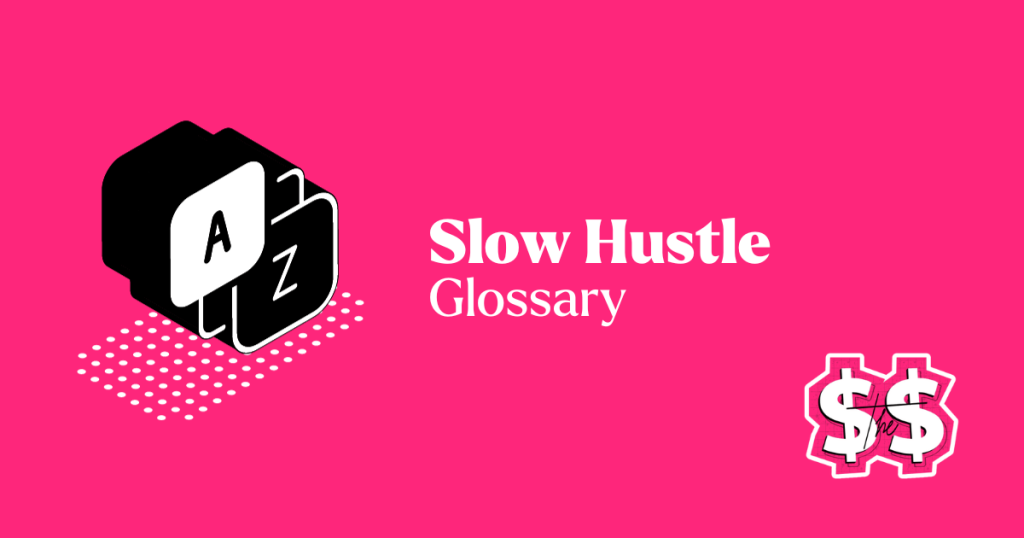Slow hustle is a mindset and approach to achieving success that involves taking small, consistent actions toward a long-term goal. It is about being patient, persistent, and intentional in one’s efforts, rather than seeking immediate gratification or shortcuts.
- Slow Hustle: A deliberate and mindful approach to entrepreneurship that prioritizes sustainable growth, well-being, and work-life balance. (ref.: slow solopreneur glossary)
- Mindful Productivity: Focusing on completing meaningful tasks with intention and presence rather than sheer volume of work.
- Lifestyle Business: A business designed to support and enhance the owner’s preferred lifestyle, often emphasizing flexibility over rapid growth.
- Side Hustle: A supplementary business or income stream pursued in addition to a primary job or business.
- Microbusiness: A small-scale business often run by a single individual, emphasizing personalized service and community connection.
- Passion Project: A venture pursued out of personal interest and passion, often integrated into the slow hustle philosophy.
- Bootstrapping: Building and growing a business with minimal external funding, relying on personal savings and organic growth.
- Niche Marketing: Targeting a specific, well-defined market segment with unique needs and preferences. (ref.: niche marketing glossary)
- Work-Life Integration: Balancing work and personal life seamlessly, recognizing that they are interconnected rather than separate entities.
- Holistic Entrepreneurship: Considering the overall well-being of the entrepreneur, including physical, mental, and emotional health.
- Purpose-Driven Business: A business that aligns its mission and values with a broader purpose, contributing positively to society.
- Customer-Centric: Placing the customer at the center of business decisions and operations, prioritizing their needs and satisfaction.
- Lean Business Model: Minimizing waste and optimizing efficiency in business processes, often associated with slow and intentional growth.
- Authentic Branding: Creating a genuine and transparent brand identity that resonates with the values of the entrepreneur and their audience.
- Holistic Marketing: A comprehensive marketing strategy that considers various channels and touchpoints, focusing on building relationships.
- Conscious Consumerism: Making intentional and ethical purchasing decisions, supporting businesses aligned with personal values.
- Cooperative Entrepreneurship: Collaborating with other businesses or individuals for mutual benefit and shared success.
- Storytelling in Business: Communicating the brand’s narrative to connect with customers on a deeper, emotional level.
- Resilient Leadership: Leading with adaptability and resilience, navigating challenges with a long-term perspective.
- Sustainable Practices: Incorporating environmentally and socially responsible practices into business operations.
- Customer Lifetime Value (CLV): The predicted revenue a business expects to earn from a customer throughout their entire relationship.
- Slow Marketing: A deliberate and unhurried approach to marketing that emphasizes building genuine connections over rapid promotion.
- Digital Minimalism: Simplifying digital tools and platforms to reduce distraction and enhance focus in business activities.
- Mindful Entrepreneur: An entrepreneur who practices mindfulness and self-awareness in decision-making and daily activities.
- Purposeful Networking: Building meaningful connections and relationships in the business world with a focus on shared values.
- Financial Wellness: Prioritizing financial stability and well-being as part of the overall entrepreneurial journey.
- Work Retreat: A planned period of dedicated work in a focused environment, often used to accomplish specific business goals.
- Community Engagement: Involvement in local or online communities to build relationships, support, and collaboration.
- Slow Growth: Prioritizing gradual and sustainable growth over rapid expansion, allowing for more deliberate decision-making.
- Holacracy: A management structure that distributes authority and decision-making across a flat organization, fostering autonomy and collaboration.

Slow hustle is often associated with small business owners, entrepreneurs, and creatives who are building their businesses or pursuing their passions. It requires patience, resilience, and dedication to keep pushing toward a goal, even when progress may be slow. The term “slow hustle” is also used to encourage a more balanced and sustainable approach to achieving success rather than constantly hustling and burning out. It emphasizes the importance of taking breaks, self-care, and maintaining a healthy work-life balance while still working towards one’s goals.
